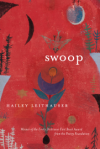Swoop
“If it could speak it would offer / you excess; it would / offer you more.”
“If it could speak it would offer / you excess; it would / offer you more.”
Thus begins “Scythe,” the opening poem in Hailey Leithauser’s Swoop, the lines operating as a double entendre inscribing the essence of the poem’s scythe as a poetic mission statement for the collection in whole.
The book is constructed from several sets of poems that overlap thematically or tonally, including a handful of poems scattered throughout titled “From the Grandiloquent Dictionary,” which toy with words like katzenjammer and illaqueable and tragematopolist; a series of ruminations on sex (“Sex Fiasco,” “Sex Circumspect,” and so on); and several poems imagining inner lives for inanimate human tools. These tool poems in particular are standouts throughout the collection; where the Grandiloquent Dictionary poems sometimes serve the conceit of the book more so than as individual poems, “Brass Knuckles” and “Scythe” and “Crowbar” and “Guillotine” are all fraught with poetic tension, and their consistent short-lined free verse forms play well against the rhymes and repetitions.
There is evident lineage in Swoop to Marianne Moore; although Moore wrote more for the page than the voice, she put great care into making exacting yet lush experiences out of her descriptions, and Leithauser is similarly precise. Swoop captures the experiential essence of moods and words and shades of sex, enacting and rejecting the constraints of form as individual poems require. Formal sonnets bump up against villanelles and broken sonnets, and free verse poems adopt an AABBA limerick rhyme scheme for a verse and then move on to something else; these poems are virtual parades of rhetorical and poetic tricks. Leithauser’s poems should be read aloud—the insistent rhyming and repetition demand it.
Such phonetic fireworks displays may, at times, begin to feel like a little much, and a collection with so much excess can’t really afford to stray very far over the line between poem and tongue twister. Following the lovely ode-like “Boys of L.A.,” for example, “Voluminous Diva” comes across unfortunately close to a limerick, punch line and all. But the frequent hits more than make up for the occasional misses; “Scythe” and “Mockingbird” and many others are perfectly realized sonic romps that illuminate their subjects masterfully.
The primary landscape of the book is one of words and moods, ethereal stuff. The poems operate sometimes literally as poetic definitions of rare words, as in the “From the Grandiloquent Dictionary” poems. Although less explicitly referent, the majority of the other poems offered here are similarly preoccupied with defining; words like “Schadenfreude” and “Rescue” and “Memoir” are detailed in odes rather than departed from as occasions for narrative. Leithauser takes evident care to render the intangible on the page, and in general does so to excellent effect.
References to canonical writers and figures appear here as well as more idiosyncratic ones; there are borrowings and oblique references to lines from Herman Melville and Marianne Moore, as well as contemporary poets and painters, and the Grandiloquent Dictionary, a quirky online project cited in Swoop’s endnotes that reads like a highlight reel of the Oxford English Dictionary. Obsessive interest in words and wordplay is everywhere here, and even the common words show a poet’s care. Consider, for example, the book’s title—Swoop—a single word that makes both an elegant glyph on the page as well as a gracefully onomatopoeic sound when voiced.
As the book opens with a declaration of excess, so its final poem “Zen Heaven” closes with an abundance of negatives, playfully offering readers “no melon, no lemon, no scone, no crumb,” and a few dozen more non-offerings. This is an overwhelming book, so rich that it is probably best dipped in and out of rather than read cover-to-cover, although the careful arrangement of the poems will certainly reward those who do begin at the beginning and read straight through to the end.
Swoop is Hailey Leithauser’s debut collection, and winner of the Poetry Foundation’s Emily Dickinson First Book Award. Wide in scope and playfully serious in tone, Leithauser’s poems are excessive in the best way possible.





